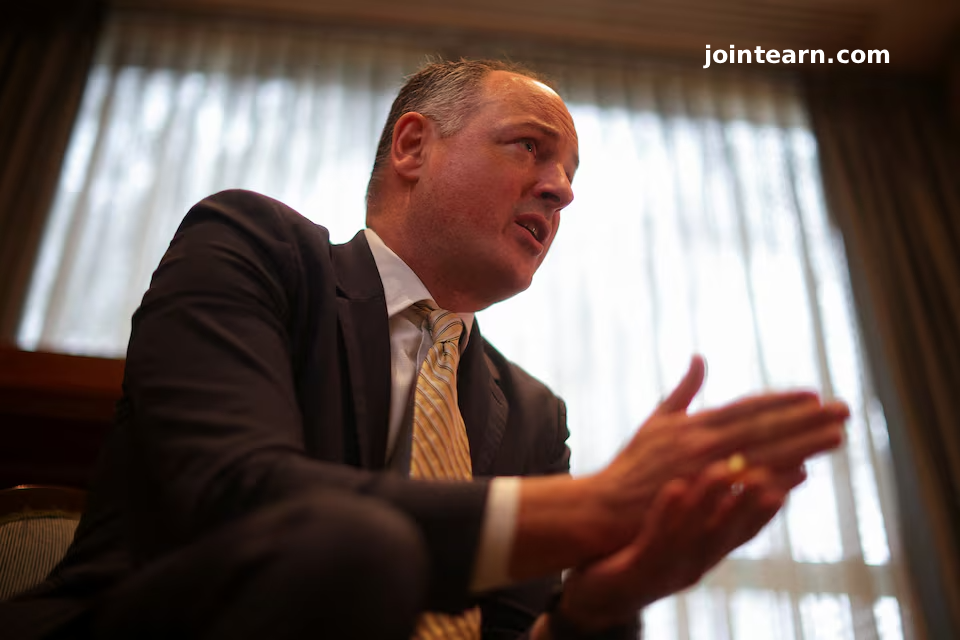
Boeing Names Landon Loomis to Lead China Operations Amid Rising U.S.-China Trade Tensions
Beijing, October 23, 2025 — In a strategic leadership move aimed at strengthening its foothold in one of the world’s largest aviation markets, Boeing Co (NYSE: BA) has appointed Landon Loomis as the new President of Boeing China. The fluent Mandarin speaker and former White House adviser brings decades of experience in aviation policy, diplomacy, and international business — credentials Boeing hopes will help stabilize its operations amid renewed U.S.-China trade tensions.
Loomis, who currently serves as Boeing’s Vice President of Global Policy, will retain that title while taking charge of the company’s day-to-day operations, market strategy, and government relations from its Beijing headquarters.
The announcement marks a pivotal moment for Boeing as it navigates complex geopolitical challenges that have strained U.S.-China relations and directly impacted aircraft deliveries, production partnerships, and the company’s long-term growth outlook in Asia.
A Seasoned Diplomat and Aviation Expert Takes the Helm
Before joining Boeing, Landon Loomis spent five years in Beijing as the U.S. Embassy’s aviation specialist, where he worked closely with Chinese regulators and airlines. He later served as Special Adviser to former U.S. Vice President Mike Pence, focusing on aviation and international trade policy.
This unique blend of diplomatic acumen, policy expertise, and cultural fluency positions Loomis as a trusted bridge between Washington and Beijing — a critical asset for Boeing at a time when the company faces both regulatory and commercial headwinds in China.
“Landon is the ideal leader for Boeing China,” said Brendan Nelson, President of Boeing Global. “His deep understanding of the industry, his government experience, and his years of living and working in China will strengthen Boeing’s partnerships and reinforce our long-term commitment to the Chinese market.”
Boeing’s Strategic Gamble: Rebuilding Trust in a Critical Market
Loomis’s appointment comes as Boeing seeks to rebuild its market share in China after a turbulent few years marked by political friction, safety controversies, and competition from European rival Airbus SE (AIR.PA).
Earlier in 2025, China briefly suspended acceptance of new Boeing aircraft, citing safety and certification issues, before quietly resuming deliveries. However, U.S. President Donald Trump recently warned that spare-part exports to Chinese airlines could soon face restrictions, putting Boeing once again at the center of a high-stakes geopolitical tug-of-war.
Boeing is reportedly negotiating a deal to sell up to 500 aircraft to Chinese carriers — a transaction that could inject billions into the struggling aerospace giant but remains contingent on the stability of U.S.-China trade relations.
Airbus Expands as Boeing Fights to Hold Ground
While Boeing works to regain momentum, Airbus has aggressively expanded its presence in China. The European planemaker opened a second A320neo assembly line in Tianjin this week, effectively doubling its local production capacity and further entrenching itself in the Chinese aviation landscape.
Industry analysts say Airbus’s proactive investment contrasts with Boeing’s more cautious approach, which has been constrained by Washington’s export restrictions and geopolitical pressure.
“Airbus’s expansion in China highlights the growing divide between U.S. and European aerospace strategies in Asia,” said a senior aviation consultant based in Singapore. “For Boeing, restoring trust and access in China will be essential to long-term competitiveness.”
Boeing’s Broader China Strategy
China remains one of Boeing’s most important international markets, historically accounting for nearly one-fifth of global aircraft demand. However, trade disputes, the pandemic, and certification delays have significantly disrupted Boeing’s deliveries and local partnerships since 2020.
Under Loomis’s leadership, Boeing is expected to focus on:
- Reinforcing regulatory relationships with China’s Civil Aviation Administration (CAAC)
- Restoring aircraft deliveries of models like the 737 MAX and 787 Dreamliner
- Expanding local partnerships in maintenance, parts supply, and technology exchange
- Navigating U.S. export policies that affect Chinese airline operations
Looking Ahead: Diplomacy Meets Business
With Landon Loomis now leading Boeing China, industry observers see his appointment as both a symbolic and strategic step toward mending Boeing’s strained ties with Beijing. His deep understanding of Chinese business culture and U.S. government policy could help Boeing find common ground amid rising economic nationalism.
Still, significant challenges remain. As trade tensions intensify, Boeing’s success in China will depend on balancing political sensitivities with commercial opportunities — a task that demands the diplomatic finesse Loomis is known for.
Key Facts at a Glance
- New Role: Landon Loomis appointed President of Boeing China
- Languages: Fluent Mandarin speaker
- Background: Former aviation specialist at the U.S. Embassy in Beijing; Special Adviser to former Vice President Mike Pence
- Current Title: VP of Global Policy at Boeing (will retain position)
- Strategic Context: U.S.-China trade tensions, potential export restrictions, Airbus expansion in Tianjin
- Goal: Strengthen Boeing’s position in China’s $1 trillion aviation market


Leave a Reply